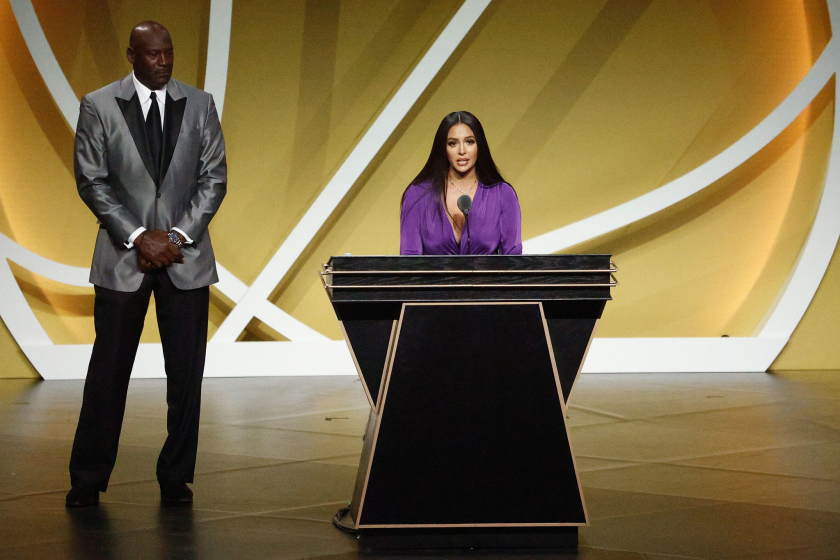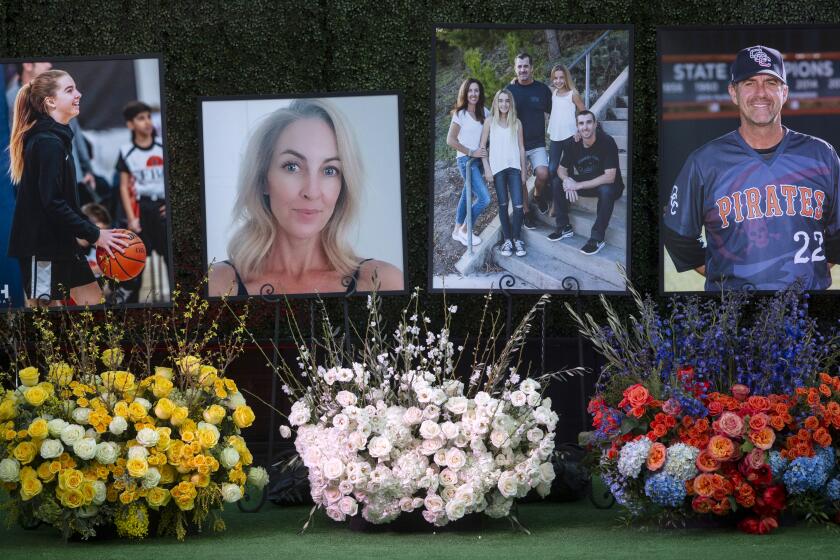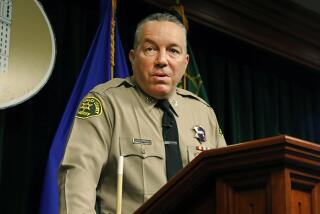Villanueva doesn’t regret telling deputies to get rid of Kobe Bryant crash photos

- Share via
Los Angeles County Sheriff Alex Villanueva said that after discovering some of his deputies had shared images of the helicopter crash that killed Kobe Bryant and eight others last year, he directed the “photos never see the light of day.”
In a deposition with attorneys for Vanessa Bryant, who is suing the county and four deputies who were investigated for sharing photos of the January 2020 crash, Villanueva said he was keeping a promise to the Lakers star’s widow that no one would see the photos of the remains of her husband and their daughter Gianna.
Villanueva said last week that, given the same circumstances, he would again direct the deputies to get rid of the photos to ensure the gruesome images did not make their way to the public. He said it was his intention the photos be deleted, although he never used that word.
In her lawsuit, Bryant says she suffered severe emotional distress after learning that deputies and firefighters had shared images from the scene of the helicopter crash that killed Bryant, Gianna and seven others on their way to a tournament. Although a judge ruled that she would not have to face a psychiatric evaluation in the lawsuit, she has been ordered to turn over therapy records to the county.
Bryant’s attorneys are seeking what are known as spoliation sanctions against the county, arguing that because the Sheriff’s Department and the L.A. County Fire Department did not order employees to preserve information on their phones that could be used as evidence, Bryant was deprived of the ability to learn with whom the crash scene images were shared before the devices were wiped clean.
County lawyers, led by outside counsel Skip Miller, argue that the deaths are what caused Bryant’s distress, not the photos. On Tuesday, Miller pushed back against Bryant’s attorneys, arguing there is no basis for her lawsuit.
“The county made extensive efforts to ensure there would be no public dissemination of crash site photos,” Miller said. “And as the plaintiff herself has acknowledged, those efforts were successful.”
Villanueva gave the direction to get rid of the images immediately after learning of a Jan. 29 citizen complaint about a deputy who displayed photos on his cellphone in a Norwalk bar, three days after the fatal crash. A Los Angeles Times investigation in March revealed that deputies had shared the grim images of the scene.
The photos were also shared internally and by a fire captain who showed them on his phone during an award shows cocktail hour.
“I can tell you this,” Villanueva testified under oath. “The problem at hand was images getting out and harming the families. I make decisions based on the immediate threat, which is a harm that those pictures can cause to the family.
“If I had to do it all over again, I’d probably make the exact same decision,” he said.
In her own deposition in the case, Bryant said she told Villanueva: “If you can’t bring my husband and baby back, please make sure no one takes photographs of them. Please secure the area.”
The sheriff said keeping that promise to Bryant was his first thought when he instructed deputies “to make it fact” — not the potential for litigation.
“I don’t make a decision based on I might get sued [in] six months,” Villanueva said.
Matthew Mauser will receive $1.25 million, and siblings J.J. Altobelli and Alexis Altobelli will share another $1.25 million.
“It’s a simple math equation. Exponential. Every single day, every single person is that much more they can be exposed. For two people, share just once becomes four people, which becomes eight, which becomes 16. And the more time goes on, that number gets bigger and bigger,” he testified. “And as it is, what we’re able to do, we’re able to cut it off and ... ensure that none of those photos ever saw the light of day, which was exactly my intention, because I didn’t want to have these people harmed.”
For the record:
3:25 p.m. Nov. 17, 2021An earlier version of this article said that a crash in which a young woman was decapitated occurred in San Diego. The crash occurred in Lake Forest.
The sheriff said in making the decision, he recalled a fatal crash in which gruesome images of a young woman who had been decapitated became referred to as “Porsche Girl.” Photos of that scene, from a crash in Lake Forest, were shared by a California Highway Patrol officer.
Villanueva said that he did not expect a lawsuit to be filed in the Bryant case because, unlike the CHP case, the images had not spread on social media.
Still, the sheriff offered an apology. “I definitely would love to have a chance to apologize to her for ... any harm or inconvenience caused by members of my department.”
Villanueva said having the photos was not a crime at the time, although that changed in September 2020 when legislation that grew out of the scandal made it illegal for peace officers and other first responders to take unauthorized photographs of dead people at the scene of a crime or accident.
Because there was no criminal violation at the time, the photos couldn’t be seized, so voluntary compliance was the only way to get the images secured, the sheriff said. Supervisors checked the cellphones of the deputies involved in the incident to make sure they had deleted the photos, Villanueva testified.
An internal investigation found 28 deputies and the same number of devices with images of the crash scene on either government or personal electronic devices, the deposition stated.
The sheriff also told Bryant’s lawyers that if the deputies who had been sharing the photos “came clean” about who had seen the photos and the images in their possession were properly disposed of, they met “amnesty” conditions and were not subject to discipline.
More to Read
Sign up for Essential California
The most important California stories and recommendations in your inbox every morning.
You may occasionally receive promotional content from the Los Angeles Times.













